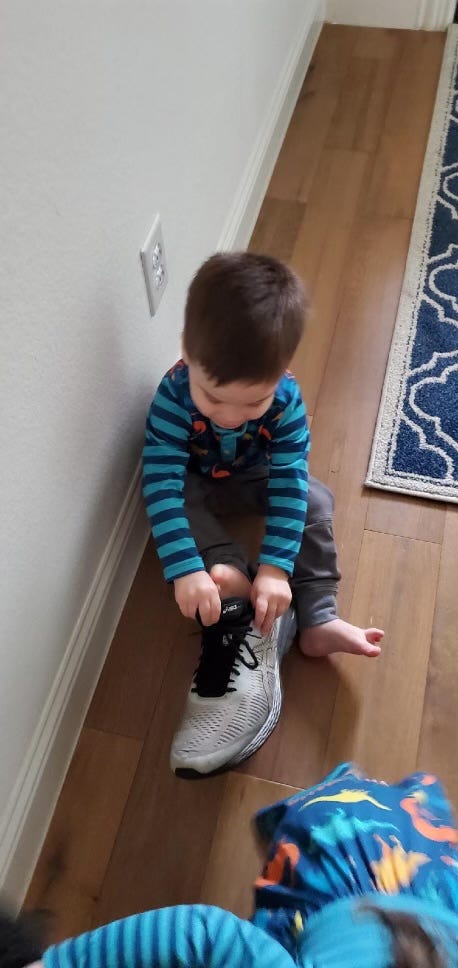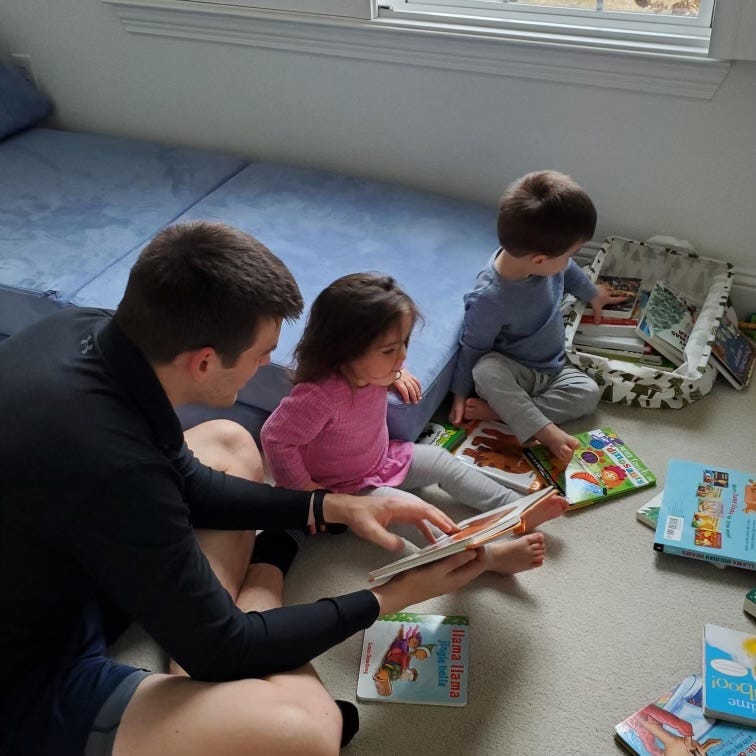We spent Thanksgiving at Doug’s (my husband) brother’s house in Dallas. He has two 2.5 year old twins, James and Grace, and a 6-month old baby girl, Ann.
Little kids are adorable. Almost everyone will agree with me on that. But if you look beyond their sweetness, you begin to realize how little kids are powerful teachers.
Adults are constantly trying to teach kids. I wanted to flip the roles and ask: What can we learn from kids? What did I learn hanging out with James, Grace, and Ann for the last four days?
More than anything, I have many questions about how we transform from kids to adults. I have many questions, but not many answers..
Kids are honest
“Grace, do you want to help Grandma do the dishes?”
“No!” Pat came the reply.
Can you imagine any adult responding that way? Kids are very honest about their thoughts and feelings. If they don’t want to do something, they’ll throw a hue and cry about it (afternoon nap time is an example). If they are eager to play a game with you, they’ll drag you into it. Kids are expressive.
As we start to grow older, we learn to mask our feelings with false words - our words and thoughts begin to be disconnected on many occasions. Why is that the case? Some of it is because we don’t want to hurt other people’s feelings. But could we create a world where we can be totally transparent without hurting others? What occasions call for us to speak white lies? Why do we get hurt by adults but not by kids? If an adult had denied help to Grandma, she might be a little upset by that, but Grace could get way with it. Why is that so?
I’m not saying it’s right for Grace to not help Grandma; I’m just saying it’s incredible for kids to be so honest with their thoughts. That’s powerful.
Kids are natural Kings and Queens
Speaking of powerful, kids know they’re in charge. They cry and adults come rushing to them. They demand more food and they get it. And if they don’t get their way the first time, they learn to become master persuaders in getting their parents to do what they want. This is no easy feat - adults can’t pull this off! Kids have a royal demeanor to them - they know they’re the kings and queens despite being tinier than us. This gives them natural self-confidence.
Do we lose this confidence with age? Why do some people retain it and some don’t? How can we learn to be master persuaders like kids? Can we truly be in charge of our own lives instead of ceding control to institutions? What are the downsides of always trying to be in control? Are kids honest because they know they control the strings? Do honesty and royalty go hand-in-hand?
Kids play their own games
Kids choose the games they want to play. Doug and I were trying to make Grace and James build Lego trains. They were interested for 2 minutes and then got bored. So they had no hesitation in walking outside the play room and devising their own game. Uncle Doug’s shoes caught their fancy - they put on shoes four times their size and began walking in them! They did this for a few minutes before the toy dinosaurs caught their eye and kept them briefly engaged. And then back they went to the play room!
There are so many good lessons and questions for adults here.
Kids know their interests and have no qualms walking away from what’s boring to them. They fill their lives with what grips their interest. As we grow older, we lose touch with what’s fun to us. We begin to think that work must be boring - “that’s just the way it is.” But could adults also fill their days with what’s fun to them? And, I don’t mean short-term pleasures like partying and alcohol. I mean activities that bring joy and peace in the now and long-term. Why don’t more adults find “work” that is play to them? Why aren’t adults honest about what they find fun? My sense is that a lot of adults feign interest in their work. Why? Aren’t we merely being dishonest to ourselves and our lives? Why can’t we have the courage to walk away from what’s not fun (like kids do) and find meaning in what intrigues us?
Kids find joy in the little things. They play with shoes, they play with forks, they play with cans of sparkling water. With age, these everyday objects begin to be overlooked. We crave fancy vacations and big houses. How do we lose our sense of joy for the little things in life? Why don’t adults marvel at the shape of a soda can?
Kids are epitomes of human ingenuity. They make their own games using whatever they find - in this case, it was our shoes!
Kids play their own games. This was the most powerful lesson for me. If kids are bored by the games adults bring to them, they’ll simply find a way to create new games. On the other hand, adults get trapped in playing games laid out by society - status games, wealth games, power games, and so on. Why don’t more adults pick and create the games they want to play? Why do we merely settle for playing games society has created for us? I think if more adults thought deeply about what games they want to play and created their own games, the world would look pretty different.
Kids are not attached to their games
Grandma brought with her a set of Go Fish cards. She started drawing the cards from her hands and asking Grace and James to tell her the colors. They did so for some of them but you could tell they wanted more to do with the cards than merely reciting colors. James grabbed the pile of cards from Grandma’s hand and laid them on the table. A wide mischievous grin spread across his face. Uh-oh.
Whoosh! In one wide swoop of his hands, the cards were on the floor. The grin was wider.
James felt so much joy in destroying the game and burying it to the floor. But he felt more joy in creating his own game from the mess of cards - next thing you know, he was on the floor having a great time picking up the cards. He once again created his own game!
Grace and James felt no hesitation in moving on from one game to the next. They weren’t attached to their games. They felt joy in their games when they were playing them, and felt equal joy in destroying the Lego blocks or moving on to something else. They were living in the present.
This is contrary to how adults live their lives. Why do we get so attached to the games we play? Why can’t adults feel a level of disinterested interest? Why is it so hard for us to shake off the past? Why don’t more of us truly live in the present?
Kids are powerful readers of humans
Before a certain age, kids don’t understand all that we speak. As a result, they have to rely on reading people based on their body language. There are many times I saw Grace and James staring at Doug and me. What were they thinking? What were they observing? Were they trying to read us? Were they trying to determine whether they can trust us? I’m fascinated by knowing what goes on inside their heads.
I think kids have to rely more on body language and less on words because they don’t understand all the words yet. But we begin to lose this art as we grow older. It’s such a lost art - often our body language conveys a lot more than words do. Our body language is telling the truth, but our words mask the truth. Why do we lose this art? How can we learn it again and get better at it? Are kids master persuaders because they can read body language well? Would human interactions look a lot different if all of us became good at reading body signals again?
Kids are good imitators
While kids are original, they also like to imitate adults.
When Grace and James were playing with their toy dinosaurs, one of them dropped a dinosaur to the floor. Their mother exclaimed, “Uh-oh.” A little someone’s ears picked up on that.
Later that evening, Grace was sitting on her dinner chair playing with her spoon. She swung her hand and tossed the spoon in the air. It landed on the floor with a tiny plop. Her eyes met ours and even though we were smiling, she knew she’d done something she wasn’t supposed to do. A brief second later, she exclaimed, “Uh-oh.”
We burst out laughing.
It seems to me like we learn how to imitate from a young age. But kids are very original too. As we age, it appears that our tendency to imitate increases and originality decreases. Is this true? If so, why is that the case? Why do many of us struggle to be original and think for ourselves? Why do we have such a strong tendency to imitate? Are all our desires mimetic, as Rene Girard would have us believe?
As I mentioned, I have more questions than answers. Being the youngest in my family, I haven’t had the chance to play with and observe kids much. Four days is not enough and I could be very off with some of my observations, learnings and questions. In time, I’ll find out.



